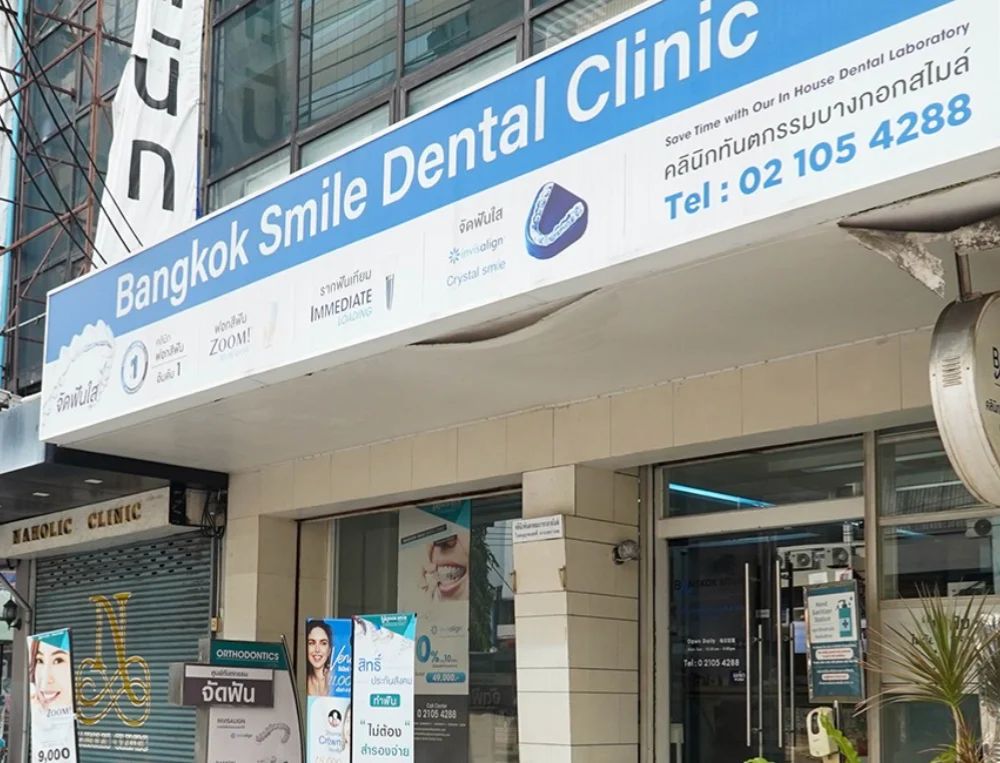Best Clinics for Dental Implant in Thailand
Losing a tooth or experiencing complications with dentures can have a significant impact on your oral health, confidence, and daily life. Dental implants offer a long-lasting solution, restoring not only function but also the aesthetics and natural feel of your smile.
Many people hold themselves from getting these implants due to the high costs or non-availability of satisfactory results in their local hospitals. You don't need to worry anymore, as Thai hospitals have a well-established dental community with internationally trained and experienced professionals in hospitals. The best part is they offer this procedure at a more affordable cost.
Read below to learn more about the best clinics for dental implants in Thailand, the type of dental implants available there, and how the procedure is done.
Cost of Dental Implant in Thailand
| Type of Dental Implant | Estimated Cost |
| All-on-4 Implants | $7,000 - $10,000 |
| Zygomatic Implants | $3,500 - $6,000 |
| Mini Implants | $800 - $1,500 |
| Immediate Load Implants | $1,500 - $3,000 |
| Single Tooth Implants | $1,000 - $2,000 |
| Multiple Tooth Implants | $2,500 - $4,500 |
We also believe in transparency. While we ensure all reviews are genuine, we cannot guarantee the accuracy of every detail. Read more about it in our Reviews Policy.
Patients Reviews Criteria




The patient review has been verified Patients Reviews Policy
 Germany
Germany
The patient review has been verified Patients Reviews Policy
 Thailand
Thailand
The patient review has been verified Patients Reviews Policy
The patient review has been verified Patients Reviews Policy
 Mexico
Mexico
The patient review has been verified Patients Reviews Policy
 Poland
Poland

We also believe in transparency. While we ensure all reviews are genuine, we cannot guarantee the accuracy of every detail. Read more about it in our Reviews Policy.
Patients Reviews Criteria




| Procedure | Cost |
|---|---|
| Veneers | Price upon request |
| All-on-2 Dental Implants | $ 3700 |
| All-on-4 Dental Implants | $ 8000 |
| All-on-6 Dental Implants | $ 12000 |
| Invisalign | $ 2250 |
| Sinus-Lifting | Price upon request |
| Dental Bridge Installation | Price upon request |
| Installation of a Dental Implant with Crown | Price upon request |
| Porcelain Veneers | $ 400 |
The patient review has been verified Patients Reviews Policy
 USA
USA
The patient review has been verified Patients Reviews Policy
 Germany
Germany
The patient review has been verified Patients Reviews Policy
 Canada
Canada
The patient review has been verified Patients Reviews Policy
 Poland
Poland
The patient review has been verified Patients Reviews Policy
 Ukraine
Ukraine


We also believe in transparency. While we ensure all reviews are genuine, we cannot guarantee the accuracy of every detail. Read more about it in our Reviews Policy.
Patients Reviews Criteria

The patient review has been verified Patients Reviews Policy
The patient review has been verified Patients Reviews Policy
 China
China
The patient review has been verified Patients Reviews Policy
 USA
USA
The patient review has been verified Patients Reviews Policy
 Japan
Japan
The patient review has been verified Patients Reviews Policy
 Mexico
Mexico

We also believe in transparency. While we ensure all reviews are genuine, we cannot guarantee the accuracy of every detail. Read more about it in our Reviews Policy.
Patients Reviews Criteria
The patient review has been verified Patients Reviews Policy
 Switzerland
Switzerland
The patient review has been verified Patients Reviews Policy
 Thailand
Thailand
The patient review has been verified Patients Reviews Policy
 Thailand
Thailand
We also believe in transparency. While we ensure all reviews are genuine, we cannot guarantee the accuracy of every detail. Read more about it in our Reviews Policy.
Patients Reviews Criteria
The patient review has been verified Patients Reviews Policy
 Australia
Australia
The patient review has been verified Patients Reviews Policy
 Thailand
Thailand

We also believe in transparency. While we ensure all reviews are genuine, we cannot guarantee the accuracy of every detail. Read more about it in our Reviews Policy.
Patients Reviews Criteria




The patient review has been verified Patients Reviews Policy
The patient review has been verified Patients Reviews Policy
 USA
USA
The patient review has been verified Patients Reviews Policy
 UK
UK
The patient review has been verified Patients Reviews Policy
 Australia
Australia
The patient review has been verified Patients Reviews Policy
 Hong Kong
Hong Kong
We also believe in transparency. While we ensure all reviews are genuine, we cannot guarantee the accuracy of every detail. Read more about it in our Reviews Policy.
Patients Reviews Criteria



The patient review has been verified Patients Reviews Policy
 Poland
Poland
The patient review has been verified Patients Reviews Policy
 Mexico
Mexico


We also believe in transparency. While we ensure all reviews are genuine, we cannot guarantee the accuracy of every detail. Read more about it in our Reviews Policy.
Patients Reviews Criteria
The patient review has been verified Patients Reviews Policy
 Thailand
Thailand
The patient review has been verified Patients Reviews Policy
 Thailand
Thailand
The patient review has been verified Patients Reviews Policy
 Singapore
Singapore


We also believe in transparency. While we ensure all reviews are genuine, we cannot guarantee the accuracy of every detail. Read more about it in our Reviews Policy.
Patients Reviews Criteria

The patient review has been verified Patients Reviews Policy
 Canada
Canada
The patient review has been verified Patients Reviews Policy
 Mexico
Mexico
The patient review has been verified Patients Reviews Policy
The patient review has been verified Patients Reviews Policy
 Mexico
Mexico
The patient review has been verified Patients Reviews Policy
 India
India

We also believe in transparency. While we ensure all reviews are genuine, we cannot guarantee the accuracy of every detail. Read more about it in our Reviews Policy.
Patients Reviews Criteria
The patient review has been verified Patients Reviews Policy
 USA
USA
Showing 1-10 of 13 clinics
What Makes Thai Clinics a Good Choice for Dental Implant?
The following are the main reasons why people prefer Thailand for dental implants:
1. Thai dental clinics have skilled and internationally trained dentists. There are more than 15,000 registered dentists in the country, most of whom have exposure to a wide variety of cases at an international level.
2. Many clinics in Thailand are equipped with modern and advanced dental technologies like cone beam CT (CBCT) scanners for detailed 3D views of the jawbone for proper implant placement and bone assessment.
3. In the United States, a single dental implant can cost anywhere from $3,000 to $6,000, while in Thailand, the same procedure can cost as low as $750 to $2,300.
This represents a cost savings of up to 70%. Knowing patients often budget for travel and stay, Thai clinics offer competitive prices to attract clients.
4. Thailand ranks among the top 10 most visited countries in the world. Patients can have a chance to combine their dental procedures with a relaxing holiday in Thailand.
Phuket, Krabi, and Koh Lanta are just a few examples of popular beach destinations perfect for post-treatment recovery.
Best Clinics for Dental Implant in Thailand
- According to Newsweek, Bumrungrad International Hospital has been ranked as one of the top clinics in Thailand. The hospital prioritizes cutting-edge technology, from 3D digital X-rays for precise diagnosis to computer-guided implant placement for increased accuracy and minimal invasiveness.
- Bangkok International Dental Center is another famous dental clinic in Thailand. Most of the dentists here are certified by the American Board of Dentists. The hospital also offers periodontal regeneration treatment, which helps in faster healing and successful implant integration.
Best Dentists in Thailand for Dental Implant
- Dr. Warasiri Pitakanonda is a famous orthodontist with over 26 years of experience. She received the Clinical Excellence Award for Master of Science in Dentistry from the University of the Pacific.
- Dr. Jugkrit Bunyakitanon is a distinguished dental surgeon at the Phuket Dental Signature Clinic. He completed his implantology course from the Thai Association of Dental Implantology.

When Do Thai Dentists Recommend Getting a Dental Implant?
Thai dentists suggest dental implants in the following conditions:
- Tooth Loss
- Failed Root Canal
- Denture Support
- Enhanced Stability for Bridges
- Preservation of Jawbone Density
- Improved Aesthetics and Function
- Restoration of Chewing Function
- Prevention of Shifting Teeth
Pre-Procedure Steps for Dental Implant in Thailand
Following are the pre-procedure steps that need to be followed before getting dental implants in Thailand:
- Undergo a thorough examination, which may include X-rays or other imaging, so that the dental surgeon can assess your oral health and determine the condition of your jawbone.
- Have a detailed discussion with the dentist about the proposed treatment plan. This includes understanding the number of implants needed, the type of restoration (crown, bridge, etc.), and any additional procedures that may be recommended.
- Ask your dentist about what to do before the procedure. This may include fasting if general anesthesia is planned and guidance on medications you should or should not take.
Fill out the form or call us for a free consultation 
Need help choosing a clinic or doctor?
What Types of Dental Implants are Available in Thailand
In Thailand, a variety of dental implants are available to cater to different patient needs. The types of dental implants commonly offered include:
Endosteal Implants:
These are the most common types of dental implants, surgically placed directly into the jawbone. Endosteal implants are made of titanium and serve as a sturdy foundation for artificial teeth.
Subperiosteal Implants:
Placed on or above the jawbone, subperiosteal implants are suitable for patients with insufficient natural bone height. They are often used when traditional implants are not viable.
All-on-4 Implants:
This innovative approach involves placing only four strategically positioned implants to support a full arch of teeth. All-on-4 implants offer a cost-effective and efficient solution for complete tooth restoration.
Zygomatic Implants:
Zygomatic implants are longer than traditional implants and are anchored in the cheekbone (zygomatic bone) rather than the jawbone. They are an alternative for patients with significant jawbone loss.
Mini Implants:
Smaller in size compared to standard implants, mini implants are often used in cases where space or bone density is limited. They are a less invasive option and can be suitable for certain types of restorations.
Immediate Load Implants:
Also known as same-day implants, these are placed and loaded with a temporary restoration on the same day. Immediate load implants can reduce the overall treatment time.
Single Tooth Implants:
These implants are designed to replace a single missing tooth. A titanium post is surgically inserted into the jawbone, topped with a dental crown that mimics the appearance and function of a natural tooth.
Multiple Tooth Implants:
When several adjacent teeth are missing, multiple tooth implants may be recommended. This involves placing multiple implants to support a bridge or set of individual crowns.

Post-Dental Implant Care Steps
After the surgery, it is important to follow post-operative care steps for optimal healing and long-term success. The recovery from the dental implants takes about 1-2 weeks to complete. Here are guidelines for post-dental implant care:
- Take prescribed or recommended over-the-counter pain medications as directed to manage any post-operative discomfort. Avoid aspirin, as it can increase the risk of bleeding.
- Apply an ice pack to the treated area for the first 24 hours to minimize swelling. Be sure to use a cloth or towel to protect the skin.
- Stick to a soft diet for the initial days, including foods like yogurt, mashed potatoes, and smoothies. Avoid hard, crunchy, or excessively hot foods.
- Maintain good oral hygiene by gently brushing your teeth and avoiding the surgical site initially. Use a prescribed antimicrobial mouthwash or a saltwater rinse as directed by your dentist.
- Avoid smoking or using tobacco products, as they can hinder the healing process and increase the risk of complications.
- Avoid strenuous physical activities for the first 5-10 days after surgery. Rest and allow your body to recover.
- Attend all scheduled follow-up appointments with your dentist to monitor the healing process and address any concerns promptly.
- Take the prescribed antibiotics or medications as directed by your dentist. Complete the full course of antibiotics even if symptoms improve.
- Refrain from consuming alcoholic beverages during the initial recovery period, as alcohol can interfere with the healing process and may interact with medications.
- Use a soft pillow to support your head while sleeping, especially during the first few nights after the procedure.
- If allowed by your dentist, gently rinse your mouth with warm saltwater or a prescribed mouthwash after meals to keep the area clean.
- Keep an eye out for any signs of infection, increased swelling, persistent bleeding, or unusual discomfort. Contact your dentist immediately if you notice any concerning symptoms.






















 Spain:
Spain:


